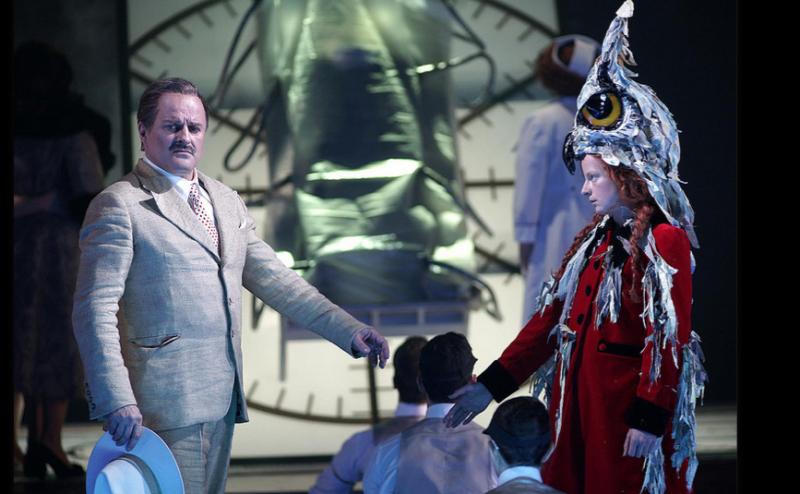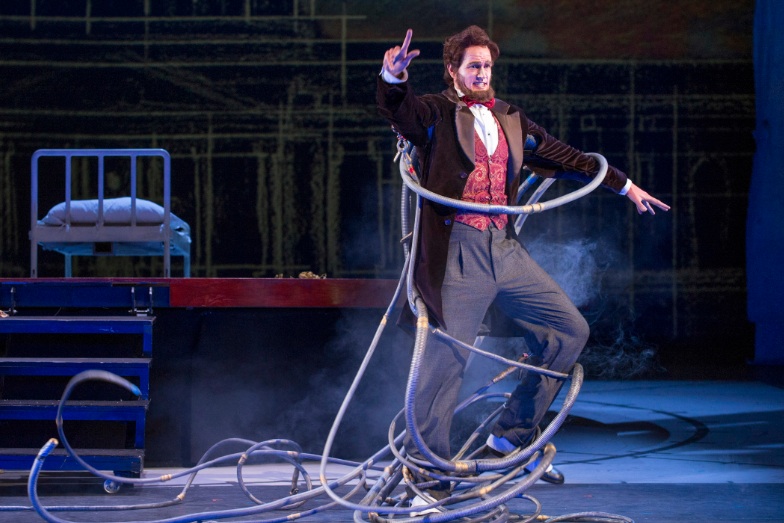The Perfect American, English National Opera | reviews, news & interviews
The Perfect American, English National Opera
The Perfect American, English National Opera
Much to admire but little to warm to in UK premiere of Philip Glass’s latest opera

There were a small but substantial number of children dotted around the auditorium at the opening night of The Perfect American, and one hopes they hadn’t been led to expect singalong-a-Disney, all bright colours and catchy tunes.
Directed by Phelim McDermott – of Improbable Theatre Company – the production arrives at the ENO after an initial outing at the Teatro Real Madrid. The set, designed by Dan Potra, is an effective fusion of mechanical and digital. Two large camera cranes suspended from above circle each other, while the cameras themselves are projectors in disguise. Sketches on drafting paper spring into animated life, which, projected onto sheets of gauze, hang hologrammatically in the air. Due credit to Leo Warner (video designer) and Joseph Pierce (animation director) who provide much of the visual appeal of the production. Although no Disney characters appear, the spectre of Mickey is a frequent theme in the projections, represented simply by one large circle topped by two smaller ones.
Disney’s disdain for the employees who produce his art is a central theme
Phillip Glass has tended to be drawn to themes in which the theatre is psychological and meditative, and The Perfect American follows that pattern by offering little in the way of forward narrative momentum – the 13 scenes which make up the action may seek to illuminate aspects of Walt Disney’s life, but do not suggest anything like cause and effect. The libretto also occasionally seems to lack purpose, the dramatic necessity of some lengthily sung conversations being questionable, when not dipping into bathos ("I’m so cold; my jugular feels like an icicle").
Disney’s disdain for the employees who produce his art is a central theme. "If I could only have my way, I would build a machine that would replace all of you", he tells William Dantine, the disgruntled draughtsman who was fired for attempting to unionise. Dantine is the narrator of Peter Stephan Jungk's novel on which the opera is based. Here he is reduced to a peripheral role, though Donald Kaasch’s portrayal of Dantine’s gradual descent into embittered destitution is a highlight of the production.
 Walt himself is played by the masterful Christopher Purves, whose natural ease and presence make him a convincing tycoon. He is assisted by an ensemble cast who all pull their weight. John Easterlin’s brilliant turn as Andy Warhol at the beginning of Act II offers a dash of levity in the otherwise dark world of the opera, while Zachary James as the malfunctioning animatronic Abraham Lincoln (pictured above by Richard Hubert Smith) is at the centre of probably the most memorable scene, his brilliantly lurching motion presumably schooled by choreographer Ben Wright.
Walt himself is played by the masterful Christopher Purves, whose natural ease and presence make him a convincing tycoon. He is assisted by an ensemble cast who all pull their weight. John Easterlin’s brilliant turn as Andy Warhol at the beginning of Act II offers a dash of levity in the otherwise dark world of the opera, while Zachary James as the malfunctioning animatronic Abraham Lincoln (pictured above by Richard Hubert Smith) is at the centre of probably the most memorable scene, his brilliantly lurching motion presumably schooled by choreographer Ben Wright.
Movement and dance are a large part of the production, with a troupe of dancers ably switching between the roles of faceless animators, nightmarish bunny rabbits and helpful stagehands. Elsewhere, the choreographed movement is less effective, as when at various points cast and chorus enact a rather stagey slow motion, the feeling being one of waiting for the music to catch up.
Conductor Gareth Jones digs into Glass’s undulating textures and produces a very subtle and atmospheric performance. This is no showpiece for the orchestra, but it demands precision and commitment from the pit, and of this there is plenty. The overall result is a production with plenty of interest and moments of brilliance but one which it is, perhaps, a little difficult to warm to.
rating
Explore topics
Share this article
Add comment
The future of Arts Journalism
You can stop theartsdesk.com closing!
We urgently need financing to survive. Our fundraising drive has thus far raised £49,000 but we need to reach £100,000 or we will be forced to close. Please contribute here: https://gofund.me/c3f6033d
And if you can forward this information to anyone who might assist, we’d be grateful.

Subscribe to theartsdesk.com
Thank you for continuing to read our work on theartsdesk.com. For unlimited access to every article in its entirety, including our archive of more than 15,000 pieces, we're asking for £5 per month or £40 per year. We feel it's a very good deal, and hope you do too.
To take a subscription now simply click here.
And if you're looking for that extra gift for a friend or family member, why not treat them to a theartsdesk.com gift subscription?
more Opera
 Cinderella/La Cenerentola, English National Opera review - the truth behind the tinsel
Appealing performances cut through hyperactive stagecraft
Cinderella/La Cenerentola, English National Opera review - the truth behind the tinsel
Appealing performances cut through hyperactive stagecraft
 Tosca, Royal Opera review - Ailyn Pérez steps in as the most vivid of divas
Jakub Hrůša’s multicoloured Puccini last night found a soprano to match
Tosca, Royal Opera review - Ailyn Pérez steps in as the most vivid of divas
Jakub Hrůša’s multicoloured Puccini last night found a soprano to match
 Tosca, Welsh National Opera review - a great company reduced to brilliance
The old warhorse made special by the basics
Tosca, Welsh National Opera review - a great company reduced to brilliance
The old warhorse made special by the basics
 BBC Proms: The Marriage of Figaro, Glyndebourne Festival review - merriment and menace
Strong Proms transfer for a robust and affecting show
BBC Proms: The Marriage of Figaro, Glyndebourne Festival review - merriment and menace
Strong Proms transfer for a robust and affecting show
 BBC Proms: Suor Angelica, LSO, Pappano review - earthly passion, heavenly grief
A Sister to remember blesses Puccini's convent tragedy
BBC Proms: Suor Angelica, LSO, Pappano review - earthly passion, heavenly grief
A Sister to remember blesses Puccini's convent tragedy
 Orpheus and Eurydice, Opera Queensland/SCO, Edinburgh International Festival 2025 review - dazzling, but distracting
Eye-popping acrobatics don’t always assist in Gluck’s quest for operatic truth
Orpheus and Eurydice, Opera Queensland/SCO, Edinburgh International Festival 2025 review - dazzling, but distracting
Eye-popping acrobatics don’t always assist in Gluck’s quest for operatic truth
 MARS, Irish National Opera review - silly space oddity with fun stretches
Cast, orchestra and production give Jennifer Walshe’s bold collage their all
MARS, Irish National Opera review - silly space oddity with fun stretches
Cast, orchestra and production give Jennifer Walshe’s bold collage their all
 Káťa Kabanová, Glyndebourne review - emotional concentration in a salle modulable
Janáček superbly done through or in spite of the symbolism
Káťa Kabanová, Glyndebourne review - emotional concentration in a salle modulable
Janáček superbly done through or in spite of the symbolism
 Buxton International Festival 2025 review - a lavish offering of smaller-scale work
Allison Cook stands out in a fascinating integrated double bill of Bernstein and Poulenc
Buxton International Festival 2025 review - a lavish offering of smaller-scale work
Allison Cook stands out in a fascinating integrated double bill of Bernstein and Poulenc
 Tosca, Clonter Opera review - beauty and integrity in miniature
Happy surprises and a convincing interpretation of Puccini for today
Tosca, Clonter Opera review - beauty and integrity in miniature
Happy surprises and a convincing interpretation of Puccini for today
 Hamlet, Buxton International Festival review - how to re-imagine re-imagined Shakespeare
Music comes first in very 19th century, very Romantic, very French operatic creation
Hamlet, Buxton International Festival review - how to re-imagine re-imagined Shakespeare
Music comes first in very 19th century, very Romantic, very French operatic creation
 Falstaff, Glyndebourne review - knockabout and nostalgia in postwar Windsor
A fat knight to remember, and snappy stagecraft, overcome some tedious waits
Falstaff, Glyndebourne review - knockabout and nostalgia in postwar Windsor
A fat knight to remember, and snappy stagecraft, overcome some tedious waits

Comments
Do I read as subtext the
Yes David - an accurate
Come on, Kimon, what does a